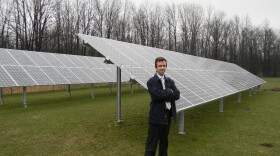Call it a case of growing pains.
Unifrax, a global manufacturer with its corporate headquarters in Niagara Falls, has pleased local officials with a spate of recent growth. That success means that Unifrax has outgrown its current location, and needs to expand.
But the company’s future no longer includes Niagara Falls.
Unifrax claims there were two options on the table: moving to Tonawanda, a journey of just a few miles, or re-locating to Indiana, a few hundred miles away.
To keep this from happening, New York State agreed to pay Unifrax $700,000 in capital grants.
The deal means 92 employees at the corporation’s headquarters will remain local, but Niagara Falls legislators are unhappy about what they see as a neighboring community poaching valuable jobs and tax revenue with the willing support of New York State.
Niagara Falls officials also feel left out of the discussion and are now questioning how such large negotiations could occur quietly behind closed doors.
How it happened
Unifrax is a ceramic fiber manufacturer that employs more than 1,400 people worldwide, in 20 facilities. It has recently acquired a batch of smaller companies. Those types of acquisitions would require a cash flow in the tens of millions, but the firm’s balance sheet specifics aren’t available because it’s not a public company.
By the end of 2012, the company will occupy a significant portion of the growing Riverview Solar Technology Park in Tonawanda.
Unifrax chose this location for a few reasons. Riverview Park owners TM Montante Development not only agreed to buy the company’s former headquarters in Niagara Falls for an undisclosed amount, the developer will also sell Unifrax solar electricity for 10 percent less than the company would pay from the grid.
“It’s not common, but in this case it made a lot of sense. Unifrax had to grow. They had to grow somewhere but they couldn’t grow where they were,” says Mathew Montante, vice president of his namesake real estate company.
But Montante’s incentives were not enough to seal the deal. Unifrax told New York State that it was seriously considering moving out of state, to Indiana, instead of taking up Montante’s generous offer. So New York officials began digging in the state’s pockets.
“Well, [the state] was involved very closely. They provided funding to Unifrax for this move,” Montante says.
But when asked to say how much public money would be given to this private company, Montante demurred.
“I prefer not to, I’m not sure what I’m able to disclose. That’s something that’s up to Unifrax to discuss with you,” he says.
Unifrax will receive a $700,000 grant from Empire State Development (ESD) for “the reimbursement of a portion of the costs associated with the acquisition and installation of new machinery and equipment (M&E) and costs associated with construction/built out of facility,” according to ESD’s Laura Magee, in an email to the Innovation Trail.
Unifrax is happy to receive taxpayer support, says spokesperson Virgina Cantera. But she wouldn’t go into specifics about how the public funds would help her company’s bottom line.
“To be honest with you, I don’t have any details for that. I can just tell you that with the help of Empire State Development we got some economic grants which will help us save money, which is a huge deciding factor to bring us to that location,” Cantera says.
Meanwhile, the Niagara County legislature passed a resolution this week that aims to prevent the “pirating” of businesses from locality by another. At this time, it’s unclear whether the legislation has the teeth to prevent a private company from working with the myriad economic development agencies in New York to incentivize a re-location.
Plans for Unifrax’s soon-to-be former headquarters are also unclear. Montante says his firm will weigh options for the building in the next year.




